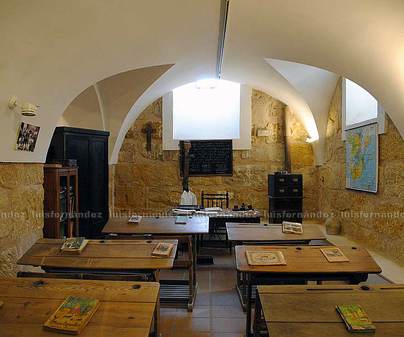
Jobs, rites and customs of Huete and La Alcarria.
Today what surround us is mechanized, a lot of machines that makes our lives easier and help us every day. We barely remember how the world was without computers or the Internet, how a house was without TV or how the things are made without buying them. That space in the memory is preserved in Huete in “el Monasterio de la Merced.”
The Ethnographic Museum of Huete invites us to walk through the rural life from 80 years ago, remembering some lost jobs and the everyday of our grandparents and great-grandparents. You can know how the farm work were made through its tools o how the process of the honey was in a very representative area like La Alcarria. Jobs such as baker, confectioner or blacksmith emphasize in these corridors the importance of these people for the rural life and the famous grocery store, groceries of products in a not very far concept.
A prominent place inside the museum is the ancient school, preserved with a lot of details and has from the Enciclopedias Álvarez on the desks to the famous map of Spain which marked the Spanish youth of the 20thcentury. But everything wasn’t work, because people have to have fun; the cinema was one of the most popular entertainments and here is kept the original machinery from the ancient cinema of Huete, which doesn’t even remember when its last projection was. One of the most famous parts of the museum is the doll collection, which gathers pieces since the end of 19thcentury and shows the most famous: “Merceditas” in Spain, “Mariquita Pérez”, “las Peponas”, etc.
The Ethnographic Museum of Huete invites you to see how they lived in Spain not so long ago, a museum so some can remember and others learn.
ACCESS
Price: 2€. Children younger than 10: free entry.
Monday afternoon and Tuesday: closed.
Winter timetable (October-April): 11:00-14:00 / 16:00-18:00.
Summer timetable (May-September): 11:00-14:00 / 17:00-19:00.
Picture: Luis Fernández.





